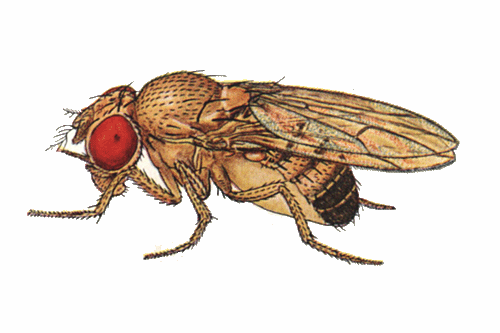GRADUATE AND POST-DOCTORAL RESEARCH IN GROWTH AND DEVELOPMENT
Positions are available for research into the control of growth or the mechanisms of neural cell fate specification, using Drosophila melanogaster to identify and characterize novel genes. Areas of current research include:
1. The mechanisms of cell cycle exit and
relationship to differentiation. Terminal differentiation is
often associated with permanent cell cycle exit. Prior work
has identified cells in the Drosophila retina whose
differentiation and cell cycle withdrawal both depend on the
Egf receptor. These seem to be separable events, because cell
cycle withdrawal can occur without differentiation when the
pathway is partly inhibited. We would like to understand the
basis of cell cycle withdrawal by terminally differentiating
cells, how to reverse it, and what the consequences are for
differentiation.
2. The mechanisms of cell fate specification.
Cell fates are generally determined by extracellular signaling
pathways. Fates become fixed when cells become insensitive to
these signals and henceforth continue to differentiate
regardless of changes in the extracellular environment.
Although much has been learned about how extracellular signals
induce cells to take different fates, little is known about
why cells cease to respond once they are specified. What is
the molecular basis for the independence of specified cells
from instructive signals?
3. Glycosylation of the receptor protein
Notch. Many cell fates are prevented by activity of a receptor
protein called Notch, so that fate specification generally
requires inactivity of this receptor. Notch and its ligands
are widely distributed, and it has been unclear why there
would ever be any cells where N was not active. In the
Drosophila retina, where N is inactive can be altered by
alterations in glycosylation of the Notch extracellular
domain. This suggests there might be a carbohydrate code that
determines where extracellular proteins will interact with
Notch and where fate specification will occur.
4. Control of organ size and shape. How is the growth of organs controlled so that they achieve the proper size and shape? In addition to controlling fate specification, extracellular signals must locally activate or arrest the cell division cycle, programmed cell death, cellular growth or morphogenetic movements. To try to identify the signals that act on these processes in vivo, we are studying ganaes and mutations that affect growth in vivo.
Graduate student positions leading to the PhD
degree are available for both US citizens and non-citizens.
Please send a preliminary enquiry to
nicholas.baker@einstein.yu.edu. Formal applications must be
made through BioMedCas, following procedures described at
their website:
https://www.einstein.yu.edu/education/phd/prospective-students/admissions.aspx
Suitable postdoctoral applicants will have
research interests in developmental signalling pathways, the
nervous system, or in the developmental control of cell
proliferation and cell death. Salary will be on the NIH scale
(currently $35,568-$51,036 according to experience, plus
benefits). PhD or equivalent in related biological discipline
and publication record preferred.
E-mail application to nicholas.baker@einstein.yu.edu
The Albert Einstein College of Medicine is
located in a residential suburb of New York City, and is an
Equal Opportunity Employer.

